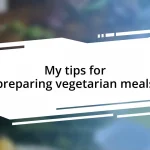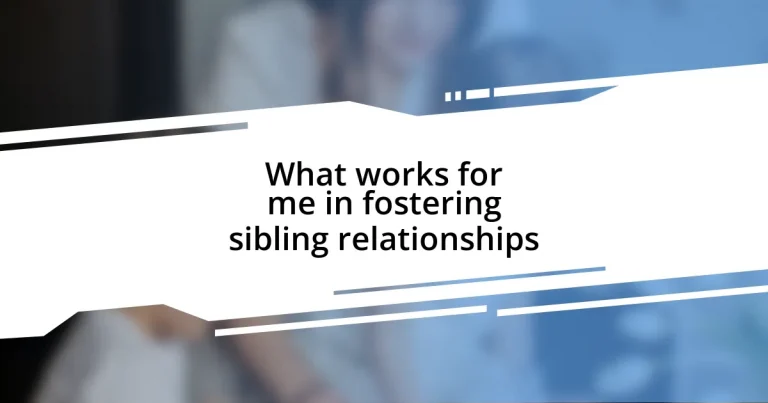Key takeaways:
- Sibling relationships are built on a blend of companionship and rivalry, emphasizing the importance of emotional intelligence and appreciation for each other’s uniqueness.
- Effective communication, including active listening and clear expression of feelings, plays a crucial role in resolving conflicts and fostering trust among siblings.
- Engaging in collaborative activities and shared family experiences, like cooking or game nights, strengthens bonds and cultivates teamwork skills.
- Teaching conflict resolution techniques and fostering empathy through small gestures helps create supportive environments, enhancing overall sibling dynamics.
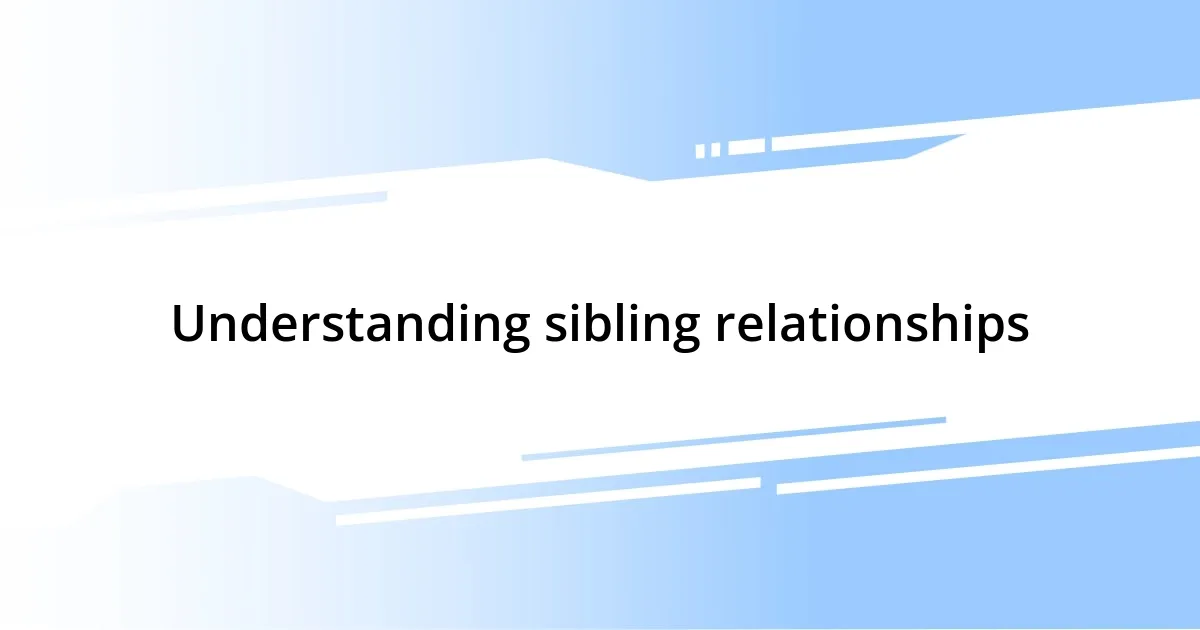
Understanding sibling relationships
Understanding sibling relationships is a complex and often emotional journey. I remember the days when my brother and I fought over the silliest things, like whose turn it was to choose the movie. Those small squabbles sometimes felt monumental, but they were also the foundation of a bond that has only grown stronger over time. Have you ever reflected on how those childhood conflicts shape your adult relationships with your siblings?
At their core, sibling relationships are a mix of companionship and rivalry. I often felt that my sister was both my fiercest competitor and my biggest cheerleader. It’s interesting how that dynamic fosters resilience and teaches negotiation skills. When we navigated our differences, weren’t we unknowingly preparing for the real world, where collaboration is key?
Emotional intelligence plays a significant role in these relationships too. I’ve found that expressing appreciation for my siblings, even in simple ways, has enriched our bond immensely. What if we all took a moment to acknowledge the unique traits our siblings bring into our lives? It’s these small gestures that cultivate a deeper understanding and connection, allowing us to truly appreciate each other’s individuality while fostering a sense of belonging.
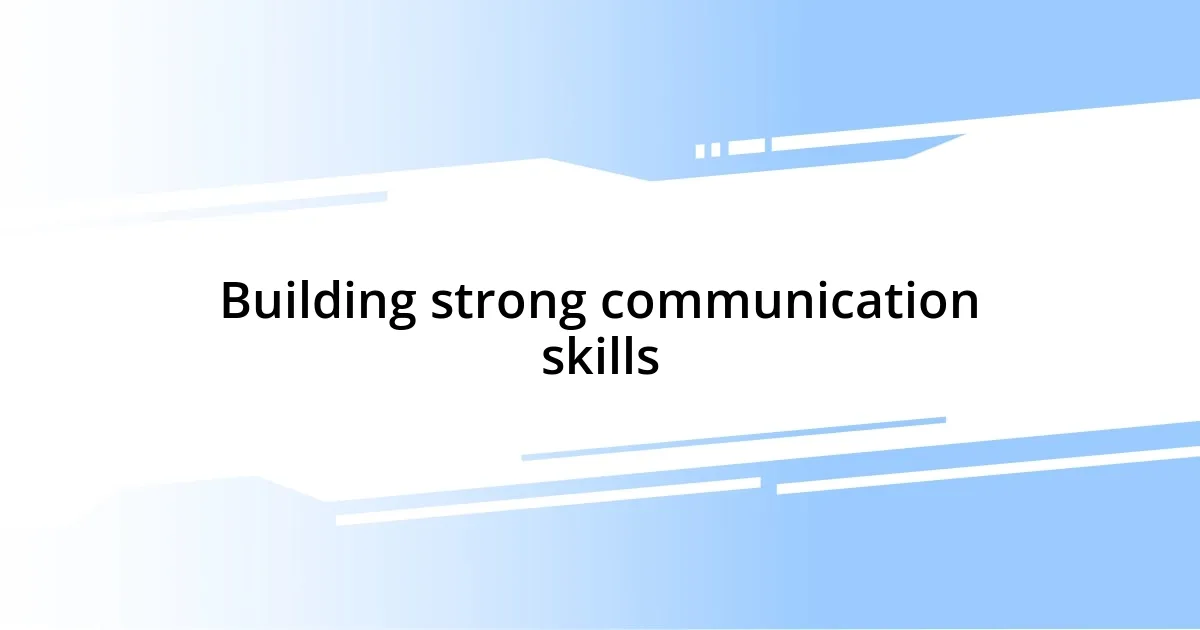
Building strong communication skills
Building strong communication skills is essential in fostering sibling relationships. One thing I’ve learned is that active listening goes a long way. I remember sitting down with my sister during a particularly rough patch. I simply put my phone away, looked her in the eye, and asked her how she felt. It was surprising how just paying attention made her open up about her concerns. Did you know that sometimes just being there, physically and emotionally, is enough to bridge gaps?
Moreover, expressing thoughts clearly can prevent misunderstandings. I used to find myself in conflicts over things that could have been easily clarified with a few straight words. One time, I asked my brother if he felt neglected because I was busy with work. His relieved face said it all; he just needed reassurance that he was valued. This taught me that articulating feelings, whether good or bad, fosters trust and openness. How do you express your feelings to your siblings?
Practicing empathy in conversations has transformed my relationships profoundly. I recall a time when I struggled with my own challenges; my younger sibling had been through a rough day. I made a point to validate his feelings first, and in doing so, we both felt lighter. By acknowledging each other’s emotions, we built a stronger bond and deepened our understanding. It’s fascinating to observe how sharing burdens can strengthen relationships, don’t you think?
| Communication Skill | Example/Application |
|---|---|
| Active Listening | Paying full attention to what the sibling is saying, like putting down devices during a conversation. |
| Clear Expression | Openly discussing feelings to prevent misunderstandings, such as reassuring your sibling of their importance. |
| Empathy | Validating each other’s emotions during tough times, exchanging support and understanding. |
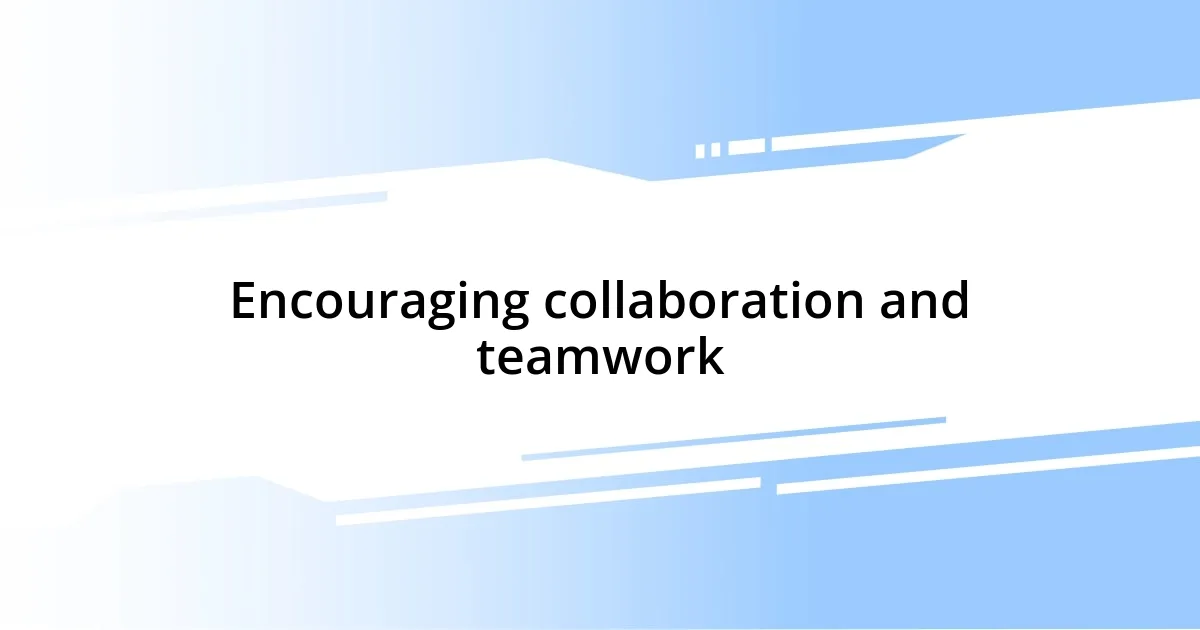
Encouraging collaboration and teamwork
Encouraging collaboration and teamwork among siblings can be a game changer in how they relate to each other. I remember a rainy afternoon when my sister and I decided to tackle a jigsaw puzzle together. Surprisingly, we discovered that combining our different problem-solving approaches not only made the puzzle assembling smoother but also sparked laughter and creativity. That day taught me that when siblings work towards a common goal, they can learn to appreciate each other’s strengths.
- Set shared goals: Working together on tasks, like a family project or even a game, can enhance coordination.
- Celebrate collective achievements: Acknowledging team efforts reinforces unity, even for small successes, like completing homework together.
- Encourage communication: Regularly discussing plans and strategies fosters teamwork; sitting down to plan a sibling outing can create excitement and anticipation.
- Create rituals: Establishing regular collaborative activities, such as family game nights, strengthens bonds and creates shared memories.
When I reflect on these moments, I realize how vital collaboration is in fostering deeper relationships. Siblings who learn to team up develop skills that go beyond play; they set a foundation for mutually supportive adult relationships, where compromise and respect thrive.
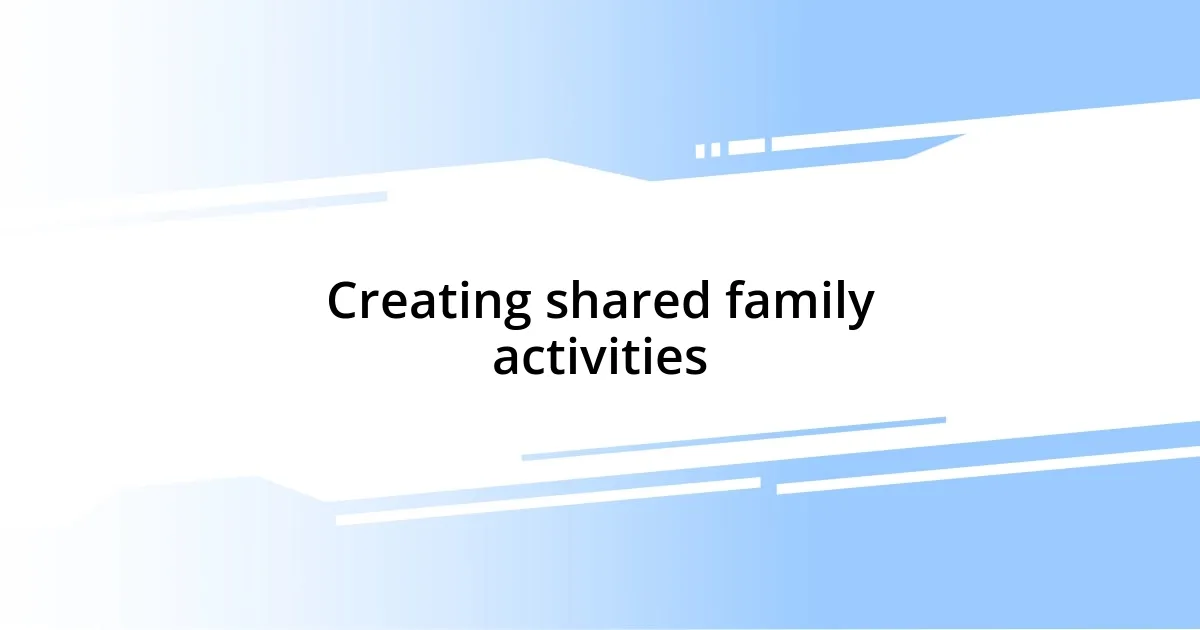
Creating shared family activities
Creating shared family activities can significantly enhance sibling connections. I remember one summer when my siblings and I decided to cultivate a small vegetable garden together. Digging in the soil, planting seeds, and, later, nurturing the plants became more than just a gardening task; it transformed into a bonding ritual. Each time we harvested, we not only enjoyed tasty vegetables but also shared stories and laughter. Isn’t it beautiful how shared responsibilities reveal individual strengths?
Another enjoyable activity we embraced was weekly family game nights. I found that these evenings instigated friendly competition, encouraging my siblings and me to strategize and communicate effectively. One memorable night, we were laughing so hard over a game of charades that I nearly cried. Moments like these etched lasting memories in our hearts—they taught us to appreciate each other’s humor and creativity. Can you think of a time when a simple game brought your family closer?
Importantly, cooking together holds a special place in our hearts as well. I recall one fateful day when we decided to tackle a new recipe that we found on a cooking show. Despite a few kitchen mishaps, the process became a delightful disaster that ended up with us bonding over spilled flour and laughter. Cooking wasn’t just about creating a meal; it was about building trust and creating a space where we could be silly and genuine with one another. Have you ever realized how engaging in these fun activities can melt away the walls between siblings?
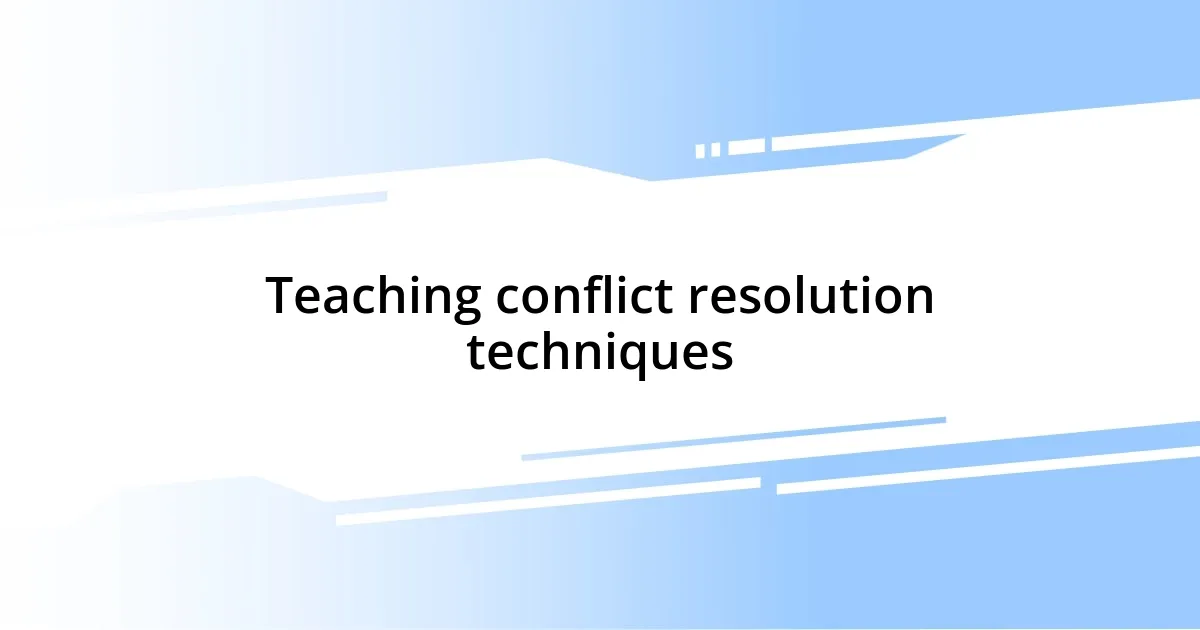
Teaching conflict resolution techniques
Teaching conflict resolution techniques can profoundly impact sibling dynamics. I remember a time when my brother and I got into a heated argument over who got to play with our shared video game console first. Instead of letting it escalate, my mom stepped in and introduced us to a simple yet effective method: the “I feel” statements technique. This approach encouraged us to express our feelings without blaming each other, which helped us understand our perspectives better. In hindsight, that moment was a huge learning point, allowing us to resolve our issues without the usual chaos. Have you ever felt frustrated in a similar situation?
Another technique I found valuable is role-playing. One evening, after an especially loud disagreement, I suggested we swap roles and act out the other person’s perspective. At first, it felt silly, but as we began to embody each other’s feelings, laughter naturally broke the tension. It made me realize that seeing things from my sibling’s viewpoint not only clarified our misunderstandings but also fostered empathy. Who knew that mimicking each other could lead to such breakthroughs?
Additionally, practicing mindfulness together has proven to be transformative. On particularly stressful days, my siblings and I would sit in a circle and take a few deep breaths before discussing our issues. This simple ritual created a calmer atmosphere, making it easier for us to express our thoughts. I remember how one session led to a beautiful conversation about our dreams and disappointments, deepening our connection. Have you considered how mindfulness might be the bridge to better communication in your family?
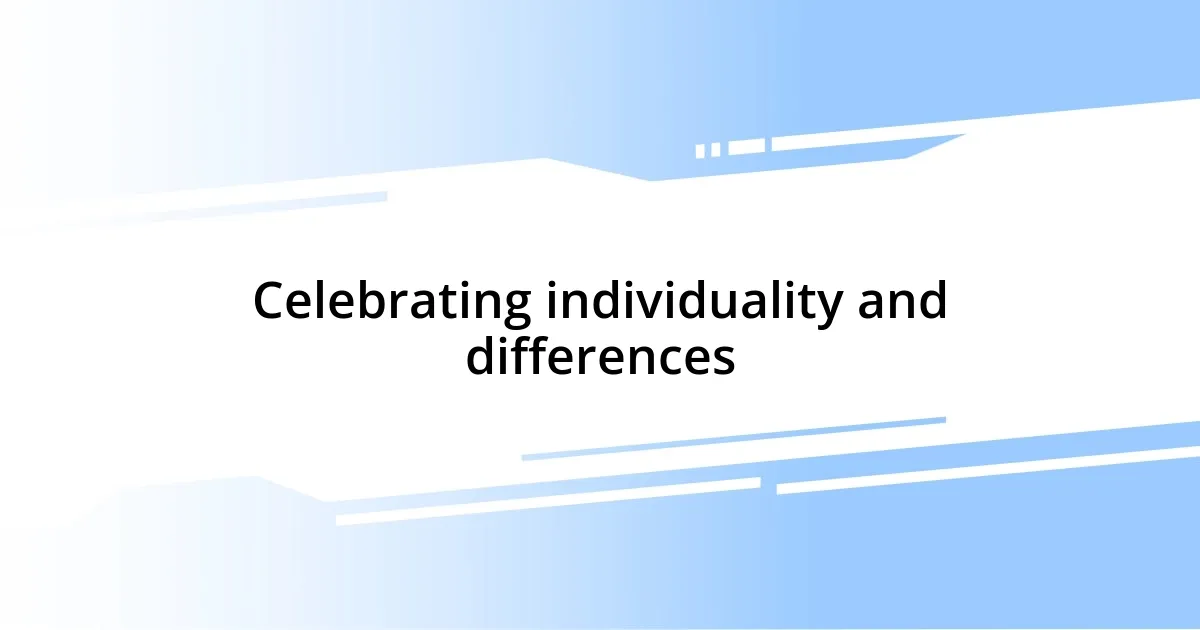
Celebrating individuality and differences
Celebrating individuality and differences within sibling relationships is vital. I vividly recall how my sister and I embraced our unique hobbies. She loved painting vibrant landscapes, while I was deeply passionate about building model airplanes. One afternoon, we decided to host an art and craft day. I was amazed by how, while we pursued our separate passions, we cheered each other on. Our individuality sparked creativity and a newfound respect for each other’s interests—doesn’t it feel wonderful when those differences become common ground for connection?
I’ve also learned the value of encouraging each sibling to share their own stories and experiences. There was a time when my younger brother felt left out because he didn’t play the same sports as us. Instead of dismissing his passion for music, we arranged a little showcase at home. Watching him perform felt like a gift! It reminded us all that embracing our differences could enhance our bond. Have you ever thought about how celebrating one sibling’s talent can help everyone feel included and appreciated?
Sometimes, even the smallest actions can make a significant difference. My siblings and I made a point to highlight what makes each of us unique during family dinners. We’d share our wins, whether it was acing a test, completing a challenging project, or even trying a new recipe. I remember how my brother’s nervous laughter turned into genuine pride as he shared about his coding assignment. Moments like these fostered an atmosphere where we could all celebrate our quirks and achievements together. How can a simple family moment transform into a celebration of individuality?
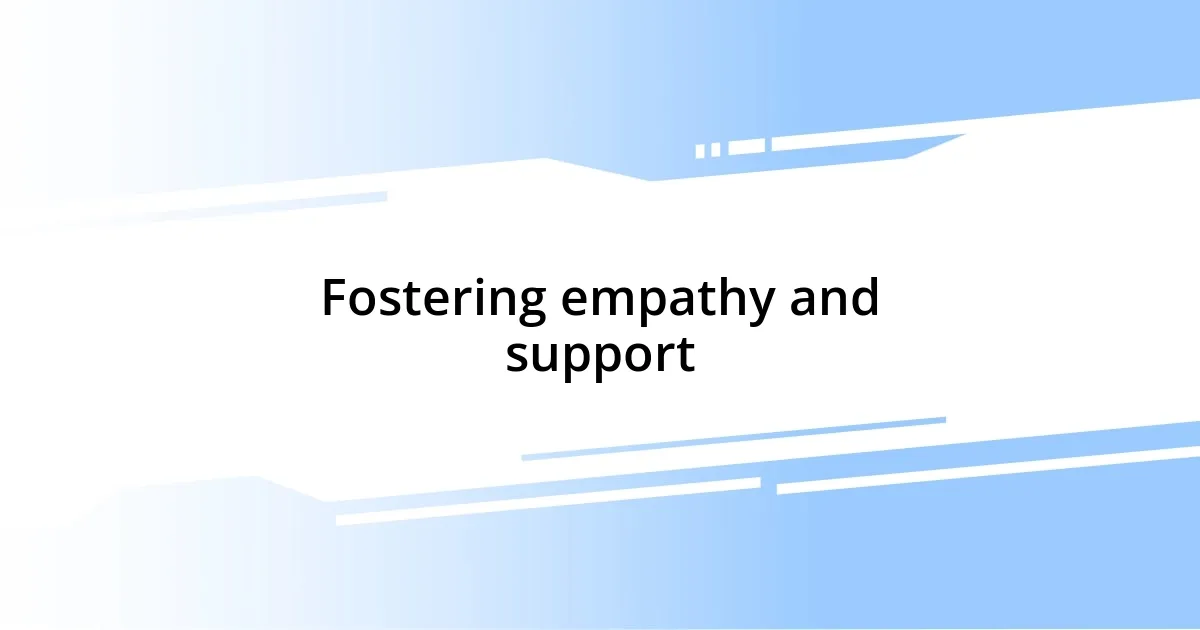
Fostering empathy and support
Fostering empathy and support among siblings often starts with simple gestures that speak volumes. I remember one evening when my sister was feeling down about a school project. Instead of brushing it off, I took a moment to listen. As we talked, I could see her tension ease and, quite frankly, it rekindled a sense of solidarity between us. Have you ever noticed how genuine listening can transform someone’s tough day into a shared experience?
There’s something special about creating a safe space for vulnerability. One of my brothers had a rough day, and instead of letting him isolate himself, I invited him to join me for a long walk. As we strolled through the park, I encouraged him to share his feelings—not just about that day, but life in general. It wasn’t just about venting; it was about understanding each other on a deeper level. Those walks became our little tradition, and along the way, they taught me that sometimes it’s the quiet moments that strengthen our bonds the most.
I’ve discovered that small acts of support can leave lasting impressions. When preparing for exams, my siblings and I started a study ritual where we’d gather and quiz each other. The laughter and occasional sighs of relief turned what could have been a stressful experience into a fun bonding moment. I still recall my younger sister shouting “I got it!” as she answered a tough question, and the pride that glowed on her face. Have you had a moment where a simple routine transformed an ordinary task into a cherished memory?




